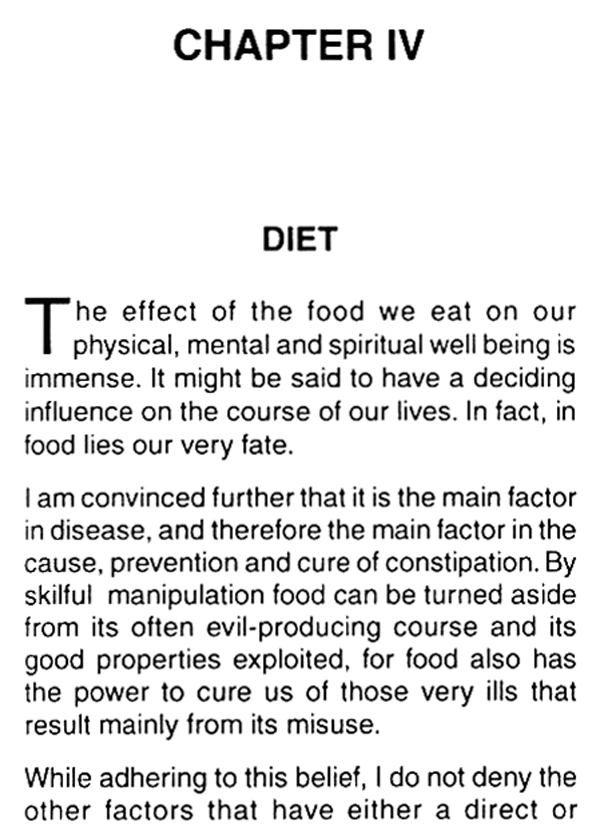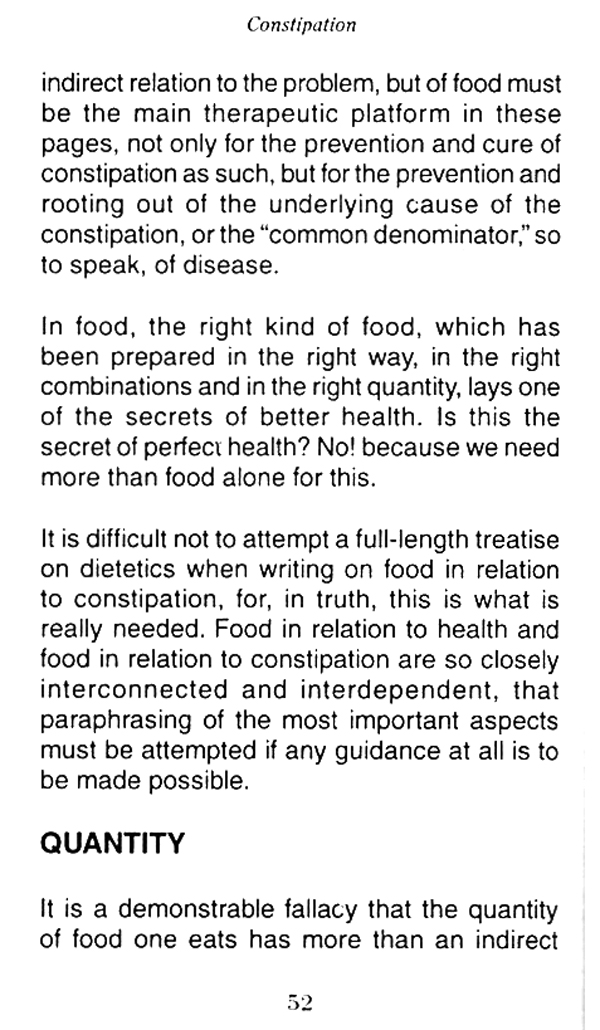
Constipation- Its Prevention and Natural Cure
Book Specification
| Item Code: | NAX834 |
| Author: | Kenneth Treuman |
| Publisher: | PILGRIMS PUBLISHING,VARANASI |
| Language: | English |
| Edition: | 2004 |
| ISBN: | 9788177691351 |
| Pages: | 141 |
| Cover: | PAPERBACK |
| Other Details | 6.00 X 4.00 inch |
| Weight | 100 gm |
Book Description
All subjects dealing with the digestive system tend to disturb the reader, who at once starts to relate much of what he or she is reading to himself or herself. At first it does not appear to be one of the most interesting subjects, but as one reads on it can become more and more enthralling especially if one is prepared to look at it objectively.
In an article written in the early sixties in one of the national newspapers it was stated that hypertension, a complaint, which had previously been associated only with the more advanced countries was slowly taking hold in India. Now as we start to move from the 20'h to the 21s1 century it is becoming more apparent especially with the gaining popularity of fast foods and beverages previously unknown to the Sub-Continent.
Constipation is a complaint, which as the author says afflicts all of us at some time or the other. We are told that although it is an indication of some other ailment it should not be treated lightly. The author tells us that our body functions in such a way that fevers or digestive problems are in fact indicative of other more acute problems that the immune system is actually fighting.This on the other hand does not mean that constipation does not harm us in any way or that we should not try to remove it.
There are many theories associated with this particular affliction. Some tell us that the use of various purgative medicines is indicated, others that the use of such crutches should be avoided at all times. This does not mean that they should never be used but that we should be very careful never to misuse them.The vast majority of the nature cure regimes tell us that it is not the medicines that we have to change but really it is our life styles, which require our attention. If we can regulate our eating habits and our diets we are going to save ourselves much grief later on.
It is believed that if we do not take proper care of our digestive systems we are practically inviting a whole host of ailments to visit our bodies. It is the bad habits that we develop whilst we are young that we eventually pay for in the later stages of life.
Discussions about the bowels and bowel movements are considered most abhorrent subjects to be carefully avoided at all times. Gandhi in his autobiography has pointed out that discussions or remarks about the same, which are a lot more common in India are taboo in Western countries, especially in Europe. So it is strange to find that a large number of Western writers and nature curists have decided to write so much about it.
The growing trend in the West to return to more natural ways of living have most obviously encouraged this kind of literature. Soon after the industrial revolution in Europe vast numbers of the population transferred themselves from their rural environments to large and congested population centres in the search of work and a better life. Work they found but alongside it they received exploitation and disease as the immediate benefits. The more astute amongst them realizing their predicament started the quest for alternative living styles, which could help them to adapt themselves totheir new conditions. It is a well-known fact that the cramped conditions of these factory workers were the most unhealthy and unnatural conditions imaginable.
It is also a fact that many of the most common ailments afflicting mankind even in these more advanced times are an extension and creation of those horrendous conditions. No doubt one could say that those conditions were the result of ignorance and the lack of what we term as modern education. There is still no getting away from the fact that if you take any living thing away from its original environment its chances of survival are minimal.
This forms the basis for most nature cure regimes that is the return to a natural way of living. This requires fresh air and natural food prepared in the simplest fashion. If one is prepared to adjust ones living style to this extent then there is a chance for you to have a good life. For surely it is true that a healthy body produces a healthy mind and so logically it follows, healthy thoughts.
This book is divided into three parts, not only because the subject naturally falls into these divisions, but for the convenience of those readers who want to read first the parts of the book that they feel might be more immediately helpful to them. Some-probably those not suffering from constipation-will react by showing a greater interest in the theoretical chapter, and others-the sufferers-will turn at once to the practical advice.
I should like to warn readers who wish to cure themselves of constipation against reading only part of the book. Almost more important than any other single factor in the treatment of disease-and no less in the treatment of constipation-is the patient's attitude of mind when carrying out any therapeutic measures. Skepticism, morbidity, distrust and the other negative emotions may ruin a cure with one person, while another, carrying out the same regime with faith, trust and reasonableoptimism, may never look back. Thus I deem it important that my would be readers should read and inwardly digest what has been said in the first chapter. I am aware that, to many, these views might appear sacrilege, but I am convinced of their truth, though so few have held them.
In one sense, this book has taken on a wider significance since I began writing it. I found, as the subject gripped me, that what I was writing about was not an isolated symptom with an isolated cause, but disease itself; and the measures necessary to promote health and maintain it. Thus, even those who do not suffer from constipation, but wish to improve their health, will find a great deal to interest and help them, I trust, in this book.
Criticisms I may expect, and if this book is successful, I shall hope for some. However, it is impossible to say everything about constipation in one book, or, if the wider definition of constipation is accepted, to know quite where constipation ends and the whole vast subject of health and disease begins.
I have made no attempt to add a bibliography, although many important works have beenconsulted. The most important have been quoted in the text, but many have only been glanced at, to provide confirmation of an attitude or a particular detail, and often I have not considered it worthwhile to draw attention to them.
Several months may seem a long time for a curative regime designed to combat constipation.The condition might be overcome in a shorter time; on the other hand, several of these periods might be needed. Nature cure is not the miracle system some people believe it to be. It works comparative wonders, but every time it is the patient who holds the key to health. If his inner desire for health is not strong, all the nature cure knowledge in the world will avail him little.
**Contents and Sample Pages**










